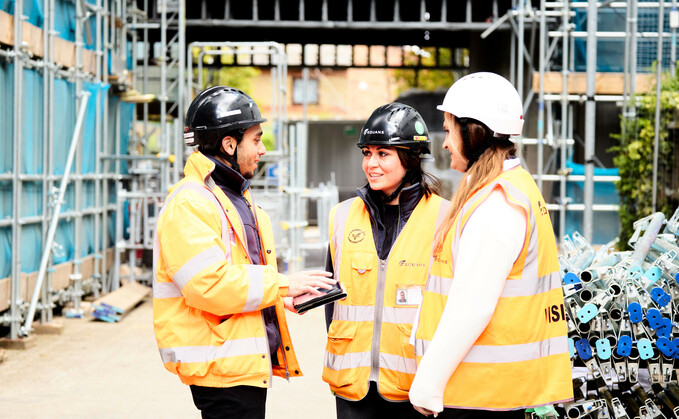
Partner Insight: Equans' head of DEI and wellbeing, Dr Helen Woolnough, highlights the vital connection between gender equality and sustainability, focusing on the importance of systemic change, inclusive leadership, and empowering women to drive progress toward global goals like net zero and the UN Sustainable Development Goals
We've all heard the adage ‘ignorance is bliss'. But in reality – opting to overlook key societal issues only serves to exacerbate problems. The threat of climate change for example was very real and prevalent for decades; but has climbed the agenda as more frequent severe weather events with life-changing consequences have become a reality.
The same too, can be said for gender inequality. Despite significant inroads in many areas, true gender equality remains elusive across much of the corporate world. The United Nations has highlighted the stark reality that ‘A girl born today, won't see gender equality in her lifetime'. Such inequality not only holds women back, but also holds back our collective progress including global efforts to combat climate change.
All 17 of the United Nations' Sustainable Development Goals (SDGs) underscore the importance of improving women's rights. From ending poverty and hunger to ensuring access to a quality education and addressing climate action; gender equality isn't a standalone ambition - it's a cornerstone for achieving bigger goals.
Gender imbalance is a roadblock we cannot afford and it's hindering our global efforts on sustainability. How can we tackle the biggest environmental threats without input from such a huge proportion of society? Women represent 50 per cent of the global population but are one of the most underrepresented groups in key sectors, which is why we can't rest on our laurels – particularly when it comes to STEM education and careers. These are the fields that will drive the technologies, innovations, and solutions needed to transition to a sustainable future.
To highlight just one example: it will take a large, skilled workforce to deliver the installations needed to achieve net zero, but installation work is traditionally male dominated. Addressing gender inequality within these career pathways is essential to scale up at the pace required to ensure we can hit the targets.
So how can we drive gender equality within our industries? It goes without saying that having leadership buy-in is vital. Too often, work to improve diversity, equity and inclusion (DEI) falls on the shoulders of the marginalised people fighting for change, and this shouldn't happen. The DEI agenda needs to start from the top. Those who have more influence in an organisation can use this to inspire and enact change.
Leadership that includes women and other underrepresented or marginalised voices, inspires innovative thinking and challenges the status quo. Diversity compels us to consider counterarguments, think outside the box, and adopt solutions that work for everyone.
We have been working hard at multiple levels within Equans to create a workplace culture which is genuinely inclusive for women as well as other under-represented groups as part of our broader sustainability efforts. While there is still much work to be done, there are several achievements which are a reference in our industries for greater gender equality.
One of the significant initiatives that has been implemented across Equans Group is our Gender+ Plan. This plan is built on three main pillars: Promoting: Integrating more women into our business and strengthening our talent pool. Facilitating: Supporting women in accessing leadership positions. Raising Awareness: Educating managers on the importance of gender diversity and equality.
It proactively involves the Group's management bodies in promoting diversity among candidates for each strategic position and raising awareness among teams to combat gender bias.
Another positive and simple step that can be taken is encouraging or implementing employee-led networks that foster belonging and build communities across diverse groups - at Equans our ‘Women Together' network helps to drive positive change. Supporting this demonstrates a clear commitment to improving DEI, but also sends a strong message to your customers. A strong DEI culture embedded in your organisation enhances your ability to serve a diverse client base, allowing you to meet the varied needs of clients, while improving trust and partnership working.
Our award-winning ‘Women in Leadership' programme is also playing a significant part in efforts to inspire and empower women to emerge as effective leaders within our business. Since the launch of the programme in 2022, we have witnessed a five per cent increase in representation of women in senior management, and 22 women from our latest cohort alone have gone on to experience promotions or role changes.
It's important to bring stakeholders on the journey with the business for better DEI, including employees, external stakeholders and partners. We have most recently done this by showcasing the authentic stories of our colleagues through our ‘Be Yourself' campaign.
One of our facilities coordinators, Paula, shared her personal journey both as a wheelchair user and becoming a mother - and how the business' adjustments have enabled her to succeed in her career. Similarly, Natalie, one of our Credit Controllers, opened up on her journey and experiences of being neurodivergent in the workplace, detailing the obstacles she faces with both Autism and ADHD and how Equans has supported her to be authentically herself and thrive.
The aim of our campaign was multi-faceted but addressing intersectionality was particularly important as there are so many variants and experiences of discrimination. Paula and Natalie are visible advocates of people that, despite the barriers they have faced in their journeys, are thriving with us and that's why it's so important we showcase it. We want to inspire and attract more diverse talent to the business and spark conversations leading to meaningful and lasting progress for our business.
We need policies and actions that can actively dismantle barriers, champion inclusivity, and create environments where women can lead, challenge and innovate. We have seen remarkable steps being taken over the last few decades and the imbalance isn't as severe as it used to be. But we can't stop here.
As we look to 2030, the target year for the SDGs, we must acknowledge two factors: that gender inequality is not a thing of the past. And that without breaking down barriers for women, we will struggle to meet our net zero targets and the wider SDGs. To achieve sustainable development, we must accelerate efforts to dismantle systemic barriers and empower women to lead, innovate, and contribute fully to society.
Let's ensure that sustainability, and all its promise, is driven by a truly diverse group of perspectives and ideas. Only then will we unlock the full potential of humanity's collective ingenuity to solve the global challenges ahead.
This article is sponsored by Equans.








